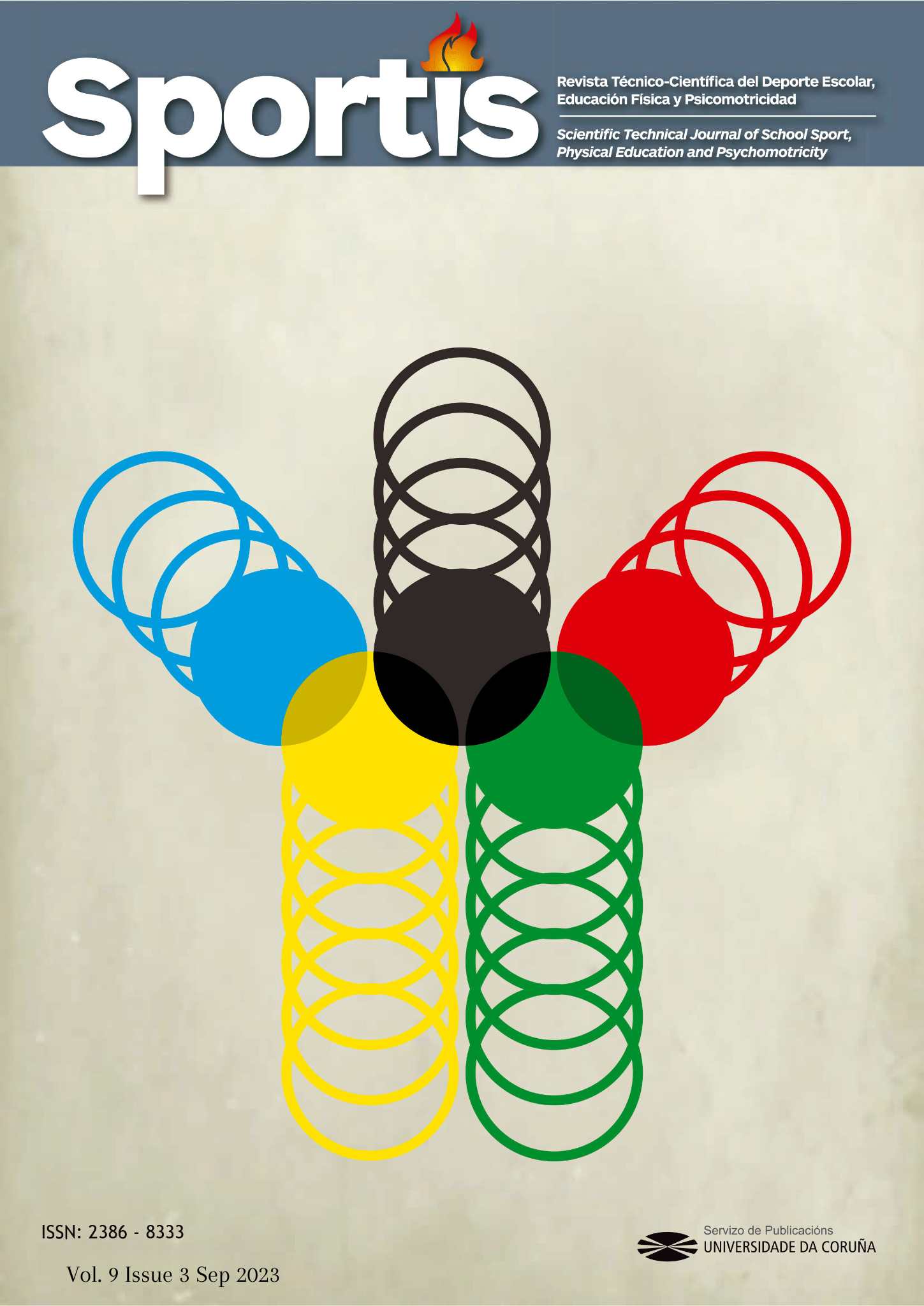Determining factors on the qualification in the competitive examinations for Physical Education in Primary Education
Main Article Content
Abstract
Competitive examinations in primary Physical Education in Spain have been little studied in the scientific literature, although every teacher in state schools has to do them. The aim of this study was to determine whether there is a relationship between teachers' experience, the number of times they have taken competitive examinations, the type of preparation, candidates’ habits, and study methods in relation to the qualifications obtained in competitive examinations in Physical Education in 2022. The 166 participating candidates completed a questionnaire and four of them were interviewed. Descriptive statistics and Cronbach's alpha coefficient were calculated to measure the reliability of the answers given by the sample in the questionnaire, bivariate correlations were obtained for all the dimensions in relation to the mark obtained, and linear regression analysis was carried out. The results showed statistically significant relationships between the final qualification of the competitive examinations and most of the variables of the study method and between the mark and the study habits. 18% of the variance of the final mark was explained by the predictors of the practice of the didactic unit, the literature of the syllabus and the elaboration of the didactic unit. In addition, 4% of the variance in the final mark was explained by the variable study habits. These results allow us to conclude that the factors influencing qualification are related to the method of study and not to experience or the number of times the candidate has taken the competitive examination.
Keywords:
Downloads
Article Details
References
Aguilar Parra, J. M., Álvarez, J., & Lorenzo, J. J. (2016). Estudio sobre las pruebas de la oposición de acceso a la función pública docente. Variables influyentes en cada fase de oposición. Educacion XX1, 19(1), 357–379. https://doi.org/10.5944/educxx1.15590
Aramendi Lekuona, G., & Aramendi Jauregi, P. (2020). El acceso a la función pública docente en Educación Infantil, Primaria y Secundaria. IKASTORRATZA. e-JRevista de Didáctica, 24, 138–159. https://doi.org/10.37261/24_alea/6
Arida, R. M., & Teixeira-Machado, L. (2021). The Contribution of Physical Exercise to Brain Resilience. Frontiers in Behavioral Neuroscience, 14, 1–18. https://doi.org/10.3389/fnbeh.2020.626769
Backer, P. R., Sullivan-Green, L. E., & Chierichetti, M. (2021). The Effects of COVID-19 on Faculty in the College of Engineering at San Jose State University. ASEE Annual Conference and Exposition. https://scholarworks.sjsu.edu/cgi/viewcontent.cgi?article=3750&context=faculty_rsca
Brandenburg, R., McDonough, S., Burke, J., & White, S. (Eds.). (2016). Teacher Education: Innovation, Intervention and Impact. Springer. https://doi.org/10.1007/978-981-10-0785-9_14
Chaput, J. P., Dutil, C., Featherstone, R., Ross, R., Giangregorio, L., Saunders, T. J., Janssen, I., Poitras, V. J., Kho, M. E., Ross-White, A., & Carrier, J. (2020). Sleep duration and health in adults: an overview of systematic reviews. Applied Physiology, Nutrition, and Metabolism, 45(10), S218–S231. https://doi.org/10.1139/apnm-2020-0034
Chaput, J. P., & Shiau, J. (2019). Routinely assessing patients’ sleep health is time well spent. Preventive Medicine Reports, 14(March), 100851. https://doi.org/10.1016/j.pmedr.2019.100851
Comisión Europea/EACEA/Eurydice. (2018). La profesión docente en Europa: Acceso, progresión y apoyo. Informe Eurydice. http://www.uco.es/cde/pdf/actualidad/2018/La_profesion_docente_en_Europa.pdf
Dávila, P. (1988). Las oposiciones al magisterio y la normalización de los saberes pedagógicos. Revista de Educación, 286(I), 115–127. http://hdl.handle.net/11162/71496
Domingos, C., Pêgo, J. M., & Santos, N. C. (2021). Effects of physical activity on brain function and structure in older adults: A systematic review. Behavioural Brain Research, 402, 1–15. https://doi.org/10.1016/j.bbr.2020.113061
Egido Gálvez, I. (2010). El acceso a la profesión docente en España en perspectiva europea. Algunas Reflexiones orientadas a la mejora de la selección del profesorado. Educacion XX1, 13(2), 47–67. https://doi.org/10.5944/educxx1.13.2.236
Erickson, K. I., Hillman, C. H., & Kramer, A. F. (2015). Physical activity, brain, and cognition. Current Opinion in Behavioral Sciences, 4, 27–32. https://doi.org/10.1016/j.cobeha.2015.01.005
García Blanco, J., Esteve bresó, J., García Suárez, M., Pérez Girbes, C. A., & Sala Ferrandis, M. A. (2010). Oposiciones: pautas para una toma de decisiones. Revista Española de Orientación y Psicopedagogía, 21(1), 165–173. http://www.redalyc.org/articulo.oa?id=338230784016
González-Calvo, G. (2020). “Sin luz al final de mi túnel”. Un enfoque narrativo en torno al profesorado interino de Educación Física de larga duración. Ágora Para La Educación Física y El Deporte, 22, 85–105. https://doi.org/10.24197/aefd.0.2020.85-105
González Calvo, G., Hortigüela-Alcalá, D., & Bores-García, D. (2023). Las oposiciones docentes de Educación Física como traba para el profesorado interino de larga duración. Apunts Educación Física y Deportes, 151, 27–35. https://doi.org/10.5672/apunts.2014-0983.es.(2023/1).151.03
Graham, L. J., White, S. L. J., Cologon, K., & Pianta, R. C. (2020). Do teachers’ years of experience make a difference in the quality of teaching? Teaching and Teacher Education, 96, 1–10. https://doi.org/10.1016/j.tate.2020.103190
Jemni, M., Zaman, R., Carrick, F. R., Clarke, N. D., Marina, M., Bottoms, L., Matharoo, J. S., Ramsbottom, R., Hoffman, N., Groves, S. J., Gu, Y., & Konukman, F. (2023). Exercise improves depression through positive modulation of brain-derived neurotrophic factor (BDNF). A review based on 100 manuscripts over 20 years. Frontiers in Physiology, 14, 1–20. https://doi.org/10.3389/fphys.2023.1102526
Lee, O., Choi, E., Griffiths, M., Goodyear, V., Armour, K., Son, H., & Jung, H. (2019). Landscape of secondary physical education teachers’ professional development in South Korea. Sport, Education and Society, 24(6), 597–610. https://doi.org/10.1080/13573322.2019.1612348
Monguillot, M., González-Arévalo, C., Tarragó, R., & Iglesias, X. (2022). El barómetro de la educación física en Cataluña en tiempos de COVID-19. Apunts Educación Física y Deportes, 150, 36–44. https://doi.org/10.5672/apunts.2014-0983.es.(2022/4).150.05
Pardo Merino, A., & Ruiz Díaz, M. Á. (2005). Análisis de datos con SPSS 13 Base. McGraw-Hill.
Requena Olmo, M. del M. (2006). Reflexiones en torno al sistema de oposiciones a la docencia primaria en España y las funciones éticas de los docentes. Cuestiones Pedagógicas, 18, 301–324. https://idus.us.es/bitstream/handle/11441/29973/Reflexionesentornoalsistemadeoposiciones.pdf?sequence=1
Ruiz Valle, M. A. (2012). La selección docente. Piedra angular para crear un sistema educativo de calidad. Revista Electrónica Interuniversitaria de Formación Del Profesorado, 15(3), 187–194. https://www.redalyc.org/articulo.oa?id=217026228016
Ruiz Valle, M. A. (2014). Evaluación del sistema de acceso a la Función pública docente en educación infantil y primaria en Andalucía. Una apuesta por la calidad del sistema [Universidad de Málaga]. http://www.tesisenred.net/handle/10803/279350
Suárez Riveiro, J. M., Rubio Sánchez, V., Antúnez Horcajo, R., & Fernández Suárez, A. P. (2013). Metas y Compromiso de los opositores al cuerpo de maestros en la especialidad de Educación Primaria. Revista de Investigación Educativa, 31(1), 77–92. https://doi.org/10.6018/rie.31.1.139661







